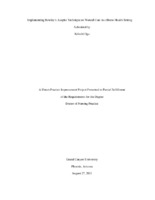Discovering the Current Wound Management Practices of Rural Africans
View File(s)
- Author(s)
- Details
-
Linda LL Benskin, PhD, RN, SRN (Ghana) CWCN, CWS, DAPWCA
- Sigma Affiliation
- Alpha Delta
Visitor Statistics
Visits vs Downloads
Visitors - World Map
Top Visiting Countries
| Country | Visits |
|---|
Top Visiting Cities
| City | Visits |
|---|
Visits (last 6 months)
Downloads (last 6 months)
Popular Works for Benskin, Linda L. L. by View
| Title | Page Views |
|---|
Popular Works for Benskin, Linda L. L. by Download
| Title | Downloads |
|---|
View Citations
Citations
Unrelenting heat, poor sanitation, lack of knowledge, and poverty contribute to a disabling wound prevalence that often exceeds 20% in rural areas of tropical developing countries. Wounds in this environment are usually poorly managed at very high cost. Traditional health practitioners and village health workers, rather than health professionals, provide health care in most villages. Wound management education for these nonprofessional health providers should include only sustainable practices which prove to be safe and effective in tropical villages. However, usual practice data, needed for comparison studies, is absent from the published literature.
This pilot study introduced an innovative data collection method to overcome cultural obstacles which have prevented researchers from obtaining meaningful quantitative data in this challenging setting. Between August and October of 2012, seventy-five participants from 25 diverse villages in Ghana provided detailed descriptions of their current usual topical wound management methods by completing the stories of patients representing each of seven wound types commonly found in this setting. Responses were tabulated and categorized as congruent or not congruent with modern topical wound management principles within three domains and six subcategories (two for each domain). Four research questions organized the data analysis.
The wound management practices of nonprofessional health care providers were identified and described in detail for the first time. These results are foundational to the process of developing culturally and environmentally appropriate wound management protocols for indigenous wound care providers in rural areas of tropical developing countries. In addition, several significant differences in the wound management of the three nonprofessional provider groups were found.
The unique data collection method introduced in this study can easily be adapted to rural areas of other tropical developing countries. When sufficient data have been accumulated, the information can be utilized to design comparison studies so that the ecological validity of the wound management protocols in planned educational programs can be ensured.
| Type | Dissertation |
| Acquisition | Self-submission |
| Review Type | Peer-review: Single Blind |
| Evidence Level | Other |
| Research Approach | Quantitative Research |
| Keywords | Africa; Wound Healing; Village Health Workers; Developing Countries; Tropical Disease; Rural Health; Ghana; Wound Management |
| MESH Subject(s) | Wound healing; Rural Health--Africa, Western |
| MESH Subject(s) | Wound healing; Rural Health--Africa, Western |
| Publisher | UTMB Repository (The University of Texas Medical Branch at Galveston) |
| Date | 2013-05 |
| Version | Post-print |
| Citation | Benskin, L. (2013). Discovering the current wound management practices of rural Africans. https://repositories.tdl.org/utmb-ir/handle/2152.3/538 |
All rights reserved by the author(s) and/or publisher(s) listed in this item record unless relinquished in whole or part by a rights notation or a Creative Commons License present in this item record.
All permission requests should be directed accordingly and not to the Sigma Repository.
All submitting authors or publishers have affirmed that when using material in their work where they do not own copyright, they have obtained permission of the copyright holder prior to submission and the rights holder has been acknowledged as necessary.
Related items
Showing items related by title, author, creator and subjects.
-
The relationship among menopausal knowledge, stress, and symptom management in southern rural African American women: A developmental perspective
Prather, Susan L.More than 12.9 million African American women are between the ages of 45 and 54, which is the perimenopausal period. Regardless of the millions of African American women transitioning to menopause yearly, very little ... -
Selecting an early child development assessment tool in rural Limpopo, South Africa
Milbrath, Gwyneth Rhiannon; Ogendi, Audrey; Compton, Madison B.; Gopinath, Vidya V.; Constance, Claire M. (2016-03-21)Session presented on Monday, November 9, 2015: More than 200 million children under five fail to reach their cognitive potential due to poverty, poor health, poor nutrition and lack of care. Providing increased cognitive ... -
Implementing Rowley's Aseptic Technique on wound care in a home health setting
Ogu, Kelechi E.Pathogen contamination is a risk factor for patients with wounds in home-based care. At the project site, there was no current evidence-based wound care guidelines for the nurses to use during wound care. The purpose of ... -
Risk factors and prevalence of STI symptoms in rural Mayan villages in Guatemala
Ezeonwu, Mabel; Stecher, Heidi A.; Smith, Lauren; Carrick, RonaldThis study investigates the prevalence of sexually transmitted infections (STIs) in rural Guatemalan villages as well as the risk factors that predispose the population particularly women to STIs. -
Knowledge of HIV/AIDS among women in rural Ugandan villages
Johanson, Linda S. (2017-06-05)Purpose: Rates of HIV have been decreasing in Uganda, however these rates, attributed to behavior change through education, have slowed in recent years (Hearst, Kajubi, Hudges, Maganda, and Green, 2012). It is unclear how ...





